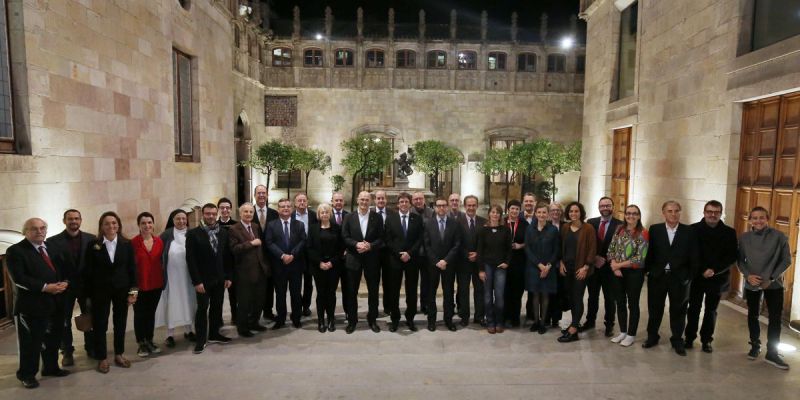Four members of UPF on the Diplocat Advisory Board
The Plenary of the Public Diplomacy Council of Catalonia (Diplocat) met on Thursday 24 November in the Sala Tàpies of the Generalitat at a ceremony presided over by Carles Puigdemont attended by the Minister of Foreign Affairs, institutional Relations and Transparency, Raül Romeva. Among the decisions taken is the creation of an Advisory Council that will advise and steer the actions of Diplocat. Its members will act for a renewable period of four years.
The 39 members of the new Diplocat Advisory Board are people of recognized international prestige in the fields of economy, politics, research, culture or other areas of interest to the organization. Its components include four members of Pompeu Fabra University: Roderic Guigó, full professor of Biomedical Informatics; Tomàs Marquès-Bonet, principal researcher at the Institute of Evolutionary Biology, a mixed UPF and CSIC centre, and UPF adjunct lecturers, Xavier Sala i Martín and Anna Veiga.

Roderic Guigó is a full professor of Biomedical Informatics at the Department of Experimental and Health Sciences (DCEXS) at Pompeu Fabra University and coordinator of the Bioinformatics and Genomics programme of the Centre for Genomic Regulation (CRG), affiliated to the UPF. He has recently been made a full member of the Institute of Catalan Studies. His research focuses on the signals involved in the specification of genes in genome sequences. His group is also involved in the development of software for the prediction of genes and genomic sequence annotation. He has participated in the Human Genome project, in the American project ENCODE, and in the BioSapiens project, an extensive European bioinformatics network.
ICREA researcher at UPF, Tomàs Marquès-Bonet leads the Research Group in Comparative Genomics of the Institute of Evolutionary Biology (IBE), a mixed UPF and CSIC centre. Marquès-Bonet has always had a major presence in international research, participating in Marie Curie actions, as EMBO Young Investigator since 2014, and involved in prestigious European projects of the European Research Council or the United States’ National Institutes of Health (NIH). He is an executive member of several international consortia related to genomics and organizer of several international symposia.
Anna Veiga is an adjunct lecturer at UPF’s DCEXS and director of the Stem Cell Bank at the Center of Regenerative Medicine in Barcelona (CMRB). Actively involved in assisted reproduction techniques since the start of in vitro fertilization, in 1982 she was appointed director of R&D&I of the Biology section of the Reproductive Medicine Service at Hospital Quirón-Dexeus, a position that she held until 2005. At present she is scientific director of the Reproductive Medicine Service at the Department of Obstetrics and Gynaecology of Dexeus Women’s Health. She was part of the team that achieved the first birth in the Spanish State by in vitro fertilization.
UPF adjunct lecturer, Xavier Sala i Martín is a professor at Columbia University in New York and Grossman Chair of economic development. Principal economic advisor to the Center for Global Competitiveness and Performance of the World Economic Forum in Davos (Switzerland), Sala i Martin is the author of the Global Competitiveness Index, the most followed index of economic and business competitiveness in the world. He is a research associate of the National Bureau of Economic Research, an advisor to the World Bank and the International Monetary Fund, and a member of the Board of Telefónica in Catalonia.
During the plenary meeting of Diplocat the annual report of the Council was presented for the year 2016. Among the activities that have been carried out within the organization’s six major areas of work are parliamentary diplomacy actions in countries such as Estonia, Switzerland and Finland; a dozen academic symposia co-organized with prestigious universities from around the world; the organization of the speech given by president Puigdemont at the prestigious Chatham House in London in the month of May; a Conference on historical memory, opened by Minister Romeva in July, coinciding with the 80th anniversary of the start of the Spanish Civil War; the conference of the North American sociologist and economist Jeremy Rifkin, organized jointly with the Barcelona Provincial Council; and the International Forum on Refugees, organized jointly with Barcelona City Council, among others.
The Public Diplomacy Council of Catalonia (Diplocat) was created in November 2012 as a public-private consortium that aims to explain Catalonia to the world and influence the international public opinion in order to improve the country’s image and reputation abroad, creating links and relations of trust with the citizens and institutions of other countries.
